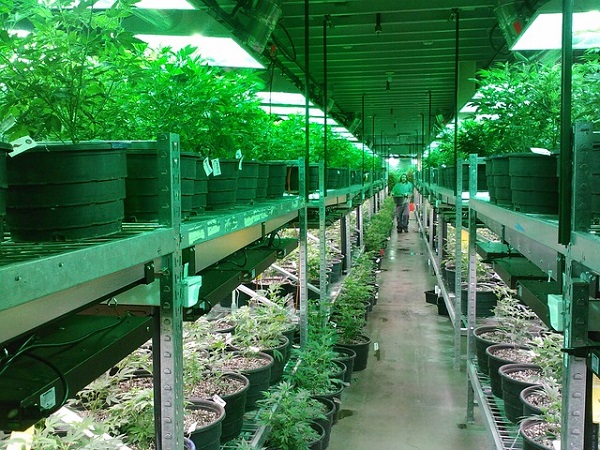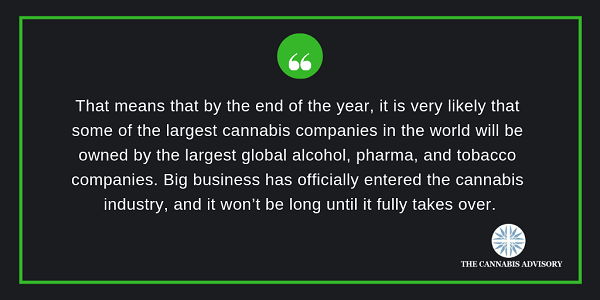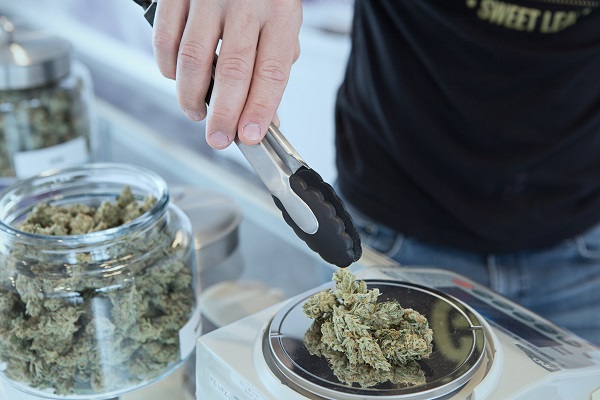The cannabis industry is growing at an exponential rate, and companies are trying to keep up. So far, most businesses in the cannabis industry have been small, independently held entities. Unlike in 2018, this year seems promising for the expansion of cannabusinesses, as cannabis mergers are expected to take over.
Major businesses in the food, tobacco, soft-drink, or pharmaceutical industries have been holding back from making moves in the marijuana field because of unforeseeable legal regulations.
So, it is not a surprise that they want to jump into the opportunity of expanding business after so many states legalized recreational cannabis and the 2018 Hemp Bill got approved on a federal level.
The business opportunities for mergers are endless. Large companies have already developed products that can easily be reformulated to include cannabis in them.
A major reason cannabusinesses have operated at a smaller scale is that the products they have can’t be transported across the U.S. border. This won’t be the case with cannabis mergers that work with already established production and distribution networks to produce and market products at scale.
How are cannabis mergers that are entering the market going to change the current state of the cannabis industry? Also, is the disruption of big business good for consumers? Let’s take a look.

RELATED: Industrial Hemp Legalized in Farm Bill 2018
High-Profile Acquisition Deals Are Already Happening
The most talked-about action in the past year was Altria purchasing a 45% stake in Cronos—a Canadian cannabis producer—for approximately $1.8 billion. Altria, the world’s largest tobacco company that makes Marlboro cigarettes and has invested in Juul, made a move that could bring the company hundreds of billions of dollars. [1]
Aside from Altria, there have been a couple other mergers and acquisitions between both larger companies alone and larger and smaller companies. Large companies are using every advantage to get their piece of the growing pie, while smaller companies that are going public are fully aware of how that decision makes them an excellent target for acquisition. [2]
The acquisition trend and merging opportunities might have started in the U.S., but that’s not the case any longer. American companies plan on investing millions of dollars on new products, growing facilities, and laboratories in Uruguay, the first country in the world to legalize marijuana. These business endeavors are expected to turn to a profit of at least $300 million in 2020, as they will hit markets in both the Americas and Europe. [3]
However, after the initial boom in Latin America, it is expected for the region’s share to lower to less than 50 percent by 2021, as the attention will be turned more toward North America and Europe because of higher medical marijuana prices. [3]
Also, it is expected that large-scale outdoor-grown cannabis will become a commodity. Real estate would be on the rise, as producers are staying away from outdoor growing facilities and instead going for more secure indoor facilities. Indoor cultivation gives them better control over the growth of the plant and its quality. Non-alcoholic, cannabis-infused beverages are about to hit the market, as there are rumors of the giant Coca-Cola getting interested in a partnership with a company that will help make CBD-infused beverages. [1]

RELATED: What is Cannabis? | Facts & Uses of Cannabis
What Can We Expect in the Future?
The last twelve months were an epic row of firsts in the cannabis industry, a trend expected to continue into 2019. Many conservative states such as Utah and Oklahoma embraced medical marijuana; cannabis was legalized for the first time through the state legislature in Vermont; and California took the lead in becoming the largest legal U.S. marketplace. Most importantly, in the past twelve months, the first marijuana-based medicine for treating kids with epilepsy has been approved.
According to experts, “Only big companies are going to be able to survive and create a long-term industry,” as reported by Bloomberg’s editor Ken Parks. [3]

One of the main issues that cannabis mergers might face is keeping up with growth. After legalizing cannabis, retailers in Canada faced cannabis shortages, and consumers were not happy about it. According to MarketWatch, British Columbia did not expect those issues to be resolved for six to 18 months, as told by licensed weed producers. [4]
This raises a couple of essential questions for the consumer: price and quality of products.

RELATED: CBD Oil Vs. Hemp Oil
How Big Cannabusinesses Will Affect Consumers
When the market gets flooded with products, the prices go low, which works great for consumers—for a while. But low prices eventually kill smaller businesses. Remaining big businesses will take this opportunity—as per usual—to reduce supply and increase prices.
While big business in the cannabis industry is great for investors, consumers might not be down for paying higher prices for cannabis products by a potential monopoly or oligopoly in the making. Instead, they might turn to the black market. If the price tag of various cannabis products doesn’t deviate much from those found on the black market, consumers might switch to buying there.
Fairly enough, most pro-cannabis states in the U.S. have established strong cannabis laws that give an advantage to local businesses run by minorities. The goal is to help close social disparity between white and black residents, as marijuana prohibition policies have hurt mostly black residents.
How long these legal regulations will last and whether small cannabusinesses survive the battle against disrupting big businesses remains to be seen.
It is worth mentioning that well-positioned companies with the financial power to acquire smaller companies also bring more money and jobs to the economy. There are also different fragments in the marijuana business, so both small and large companies can take part in the growing cannabis industry.
We can only hope that U.S. states and other countries will implement and execute proper legal regulations to protect the consumer from unethical products and keep the message of the rising cannabis industry down to how it officially started: an opportunity for people to enjoy the benefits of marijuana or hemp, without legal restrictions.
Sources:
- https://www.forbes.com/sites/kriskrane/2018/12/19/cannabis-attracts-big-tobacco-alcohol-and-pharma-which-big-industries-will-join-next/#5d637f798daf
- https://www.forbes.com/sites/julieweed/2018/12/27/2019-explosion-of-cannabis-mergers-and-acquisitions-is-predicted/#26c31dfa7793
- https://www.bloomberg.com/news/articles/2018-11-30/big-cannabis-to-emerge-next-two-years-after-m-a-flurry-icc-says
- https://www.cannabisbusinesstimes.com/article/metrospaces-deal-cannabis-acquisitions-real-estate-mergers/

